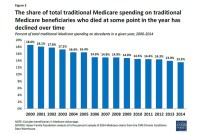Latest KFF Health News Stories
Despite Opioid Concerns, Seniors Often Exit The Hospital With Prescription: Study
Researchers found that nearly 15 percent of seniors filled prescriptions for an opioid painkiller after leaving the hospital and of those, 42.5 percent had the order refilled later.
Younger Seniors Amass More End-Of-Life Care Than Oldest Americans, Study Finds
A Kaiser Family Foundation analysis sheds new light on a widely-held belief about the costs of end-of-life care.
Hospital Finance Measure On California Ballot May Stump Voters
Proposition 52 would permanently enshrine a significant source of funding for hospitals and limit lawmakers’ ability to change it.
Palliative Care Sometimes Adds To Families’ Stress Burden, Study Finds
A study in JAMA finds palliative care counseling for families of chronically ill patients is not routinely needed by all and sometimes increases symptoms of post-traumatic stress.
Seven Remaining Obamacare Co-Ops Prepare Survival Strategies
Two-thirds of the federally funded co-ops created by the health law to sell health insurance to individuals and small employers have folded and those that remain are diversifying to stay alive.
Vaccines Are Not Just For Kids
California’s leading physician organization is heading a drive to convince adults they need their vaccinations, too.
Few Young Doctors Are Training To Care For U.S. Elderly
Only about half of geriatric fellowships for medical residents in the U.S. are filled each year. Some students blame overwhelming medical school debt, which grows with every extra year of training.
Viejos moteles cobran nueva vida ayudando a las personas sin hogar a sanar
El uso de moteles deteriorados para cuidar y albergar temporalmente a personas sin hogar recientemente dadas de alta del hospital ayuda a estabilizarlos de manera económica, previniendo retornos innecesarios y costosos a las salas de emergencia y a los hospitales.
Doctors Get Creative To Distract Tech-Savvy Kids Before Surgery
Anxiety before surgery can be dangerous for kids. Medication can help calm them down. But an anesthesiologist in California has come up with a safer, cheaper and much more entertaining alternative.
NIH’s Fauci On Combating Zika: ‘You Have To Have The Resources To Act Quickly’
Anthony Fauci, director of the National Institute of Allergy and Infectious Diseases, recently spoke with KHN’s Carmen Heredia Rodriguez about vaccine development and the ongoing fight in Congress over emergency funding.
Many Toddlers Fail To Get Necessary Medicaid Renewal At Their First Birthday
Infants born to women covered by Medicaid or CHIP may be automatically eligible for that insurance during their first year, but advocates say confusing rules and bureaucratic problems too often prevent an easy extension of that coverage.
Heart Failure Patients Warned About The Dangers Of Mixing Prescriptions
The American Heart Association issues a statement to guide heart failure patients and doctors about the effects that drugs for other conditions can have on the heart.
Patients Sometimes Take Antibiotics Without Consulting A Doctor, Study Finds
Instead of getting a doctor’s prescription, these patients opt to use leftover, unfinished medication from previous ailments.
Busting Myths About Mental Illness
Mental illness is common — and so are misperceptions about it. These too-often-believed myths can be harmful to you and your loved ones.
Zika Traveling Tips: Some Issues To Consider
Organizations ranging from the Centers for Disease Control and Prevention to the Pan American Health Organization offer a range of resources regarding the Zika virus to help keep travelers safe and informed about risks.
Sounds Like A Good Idea? Regulating Drug Prices
Presidential candidates from both parties have proposals they say would help lower the cost of prescription drugs. But most experts say that efforts to regulate prices might not end up saving much money.
Inaccurate Provider Lists A Major Barrier To Care, Study Finds
Research published in Health Affairs shows that new patients were able to get an appointment with a primary care doctor less than 30 percent of the time.
A Young Latina In Baltimore Struggles To Keep Her Family Healthy
Immigration status and low incomes are barriers to health care and health insurance for many.
House Panel Extends Funding For Medicare Program To Help Consumers
The decision runs counter to a Senate committee that voted to strip the $52 million appropriation for the State Health Insurance Assistance Program, which helps beneficiaries understand their Medicare coverage and helps them with billing issues.
Planear por adelantado para cuidados al final de la vida
Un nuevo beneficio de salud disponible para millones de californianos anima a las personas a discutir opciones con los doctores para cuidados al final de la vida.


























